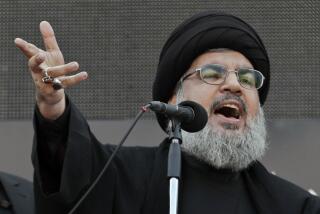Abul Abbas: A Long History of Guerrilla Activity
- Share via
CAIRO-Abul Abbas, accused by the United States of masterminding last week’s terrorist operation that culminated in the hijacking of an Italian cruise ship, has for years been a guerrilla leader in the armed struggle to establish a Palestinian state.
Abbas, who is also known under names of Mohammed Abbas, or Abu Khaled, is a tall, powerfully built 38-year-old who chain-smokes Marlboros.
He is the nominal leader of a pro-Iraqi faction of the Palestine Liberation Organization called the Palestine Liberation Front. Last week, he emerged as a principal figure in negotiations with the four terrorists to resolve the hijacking of the Achille Lauro, which ended Wednesday after two days of terror and the death of a 69-year-old American passenger.
However, U.S. and Israeli officials maintain he was more than just a mediator. They say that Abbas masterminded the terrorist operation that led to the hijacking of the cruise ship.
The U.S. Justice Department, on Friday night, obtained an arrest warrant for Abbas, charging him with piracy, hostage-taking and conspiracy to commit both crimes.
White House spokesman Larry Speakes on Sunday said Abbas is “one of the most notorious Palestinian terrorists and has been involved in savage attacks on civilians.”
Despite U.S. efforts, Italian authorities, citing insufficient evidence, allowed Abbas--who was aboard the Egyptian plane carrying the four hijackers that was diverted by U.S. jets to Sicily on Friday--to leave for Yugoslavia on Saturday.
In a report from Belgrade on Sunday, Abbas was quoted as saying that the hijacking was actually a planned assault on Israel that went awry.
He was quoted by the Middle East News Agency as saying that the four terrorists boarded the Italian ship, which was to make a stop at the Israeli port of Ashdod, to carry out “a suicide mission” in Israel. He said the plot misfired and the hijacking and the killing of Leon Klinghoffer ensued when the terrorists were discovered aboard the ship.
Israeli intelligence experts believe Abbas was involved in another bloody raid--that on Nahariya in northern Israeli in 1979 by a four-man Palestine Liberation Front terrorist team. Four Israelis, including two children, were killed in that attack.
Over the years, Abbas’ faction has also had a penchant for unorthodox tactics, including several attempts to slip terrorists into Israel on hang gliders and hot-air balloons. These attempts, however, mostly resulted in either the deaths or capture of the terrorists involved.
Although allied with Yasser Arafat, Abbas’ faction has disagreed with the PLO chairman on certain key issues.
Abbas, for example, opposes Arafat’s February agreement with King Hussein of Jordan on a formula for Mideast peace. The agreement seeks to open negotiations to settle the Arab-Israeli conflict with the aim of a confederated Jordanian-Palestinian state.
In a recent interview with Reuters news agency, Abbas explained that he opposes the confederation plan and is holding out for an independent Palestinian state--the position agreed upon at an Arab League summit in Fez, Morocco, in 1982.
Arafat tolerates Abbas’ divergent views because his Palestine Front faction, though small, is important to Arafat’s mainline Fatah faction of the PLO, some Western diplomats say. Last November, Abbas was elected to the PLO Executive Committee, which nominally acts as Arafat’s Cabinet.
Arafat underlined his support for Abbas last month when he attended a Palestine Front congress in Tunisia at which Abbas was elected secretary general of the group.
Like many PLO leaders, details of Abbas’ early life are unclear.
PLO sources say he was born in Haifa in what is now Israel in 1947 and, after establishment of the Jewish state, moved with his family to Syria where he spent some time in the Palestinian refugee camp of Yarmuk. He studied Arab literature and English at Damascus University.
In 1967, he joined the Popular Front for the Liberation of Palestine, a Marxist-oriented PLO faction. But Abbas and others in the front believed that the organization was too interested in political philosophy at the expense of armed struggle.
A year later, Abbas joined former Syrian army officer Ahmed Jibril in breaking with the Marxist faction to form the Popular Front for the Liberation of Palestine-General Command.
In 1977, Abbas and a few of his followers split from Jibril’s group and formed the Palestine Liberation Front which, in turn, broke into three factions. PLO sources say Abbas’ group currently numbers no more than a few hundred.
After Israel forced the PLO to evacuate Beirut in 1982, Abbas fled to Syria. Later, after President Hafez Assad of Syria began cracking down on PLO activities, Abbas moved to Iraq. He is now believed to be based in Tunisia.
More to Read
Sign up for Essential California
The most important California stories and recommendations in your inbox every morning.
You may occasionally receive promotional content from the Los Angeles Times.












